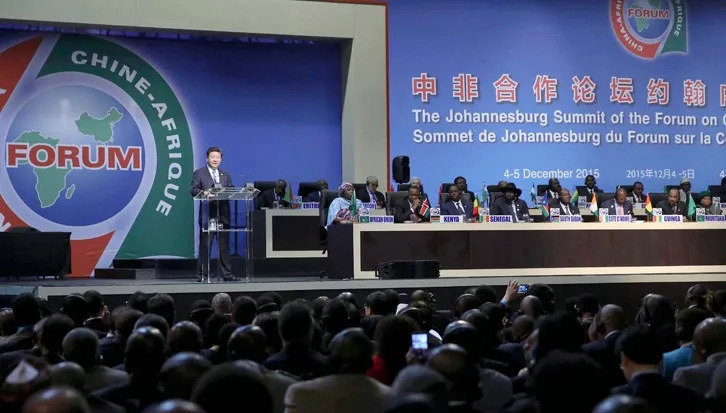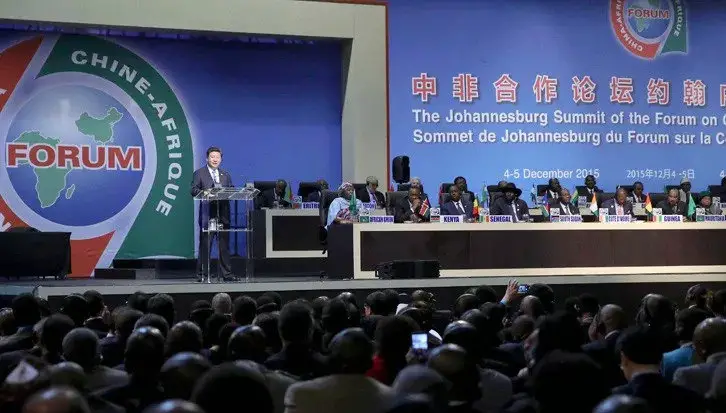By Zhong Fei

Chinese President Xi Jinping said during his visit to Africa this July that China and Africa were natural allies in international affairs.
The Chinese and African people have developed a deep friendship through the long-term joint struggle against imperialism, colonialism, hegemonism, and power politics. Together they have put great endeavors into pushing the international order toward a fairer and more reasonable direction.
In the new era of construction and development, both China and Africa carry the historic responsibility of national development and rejuvenation. As the largest developing country and a continent with the largest number of developing countries respectively, China and Africa share common concerns and interests in international affairs.
Under such circumstance, their collaboration and mutual support are an inevitable choice given the historic background and realistic demands.
China and Africa support each other on issues of core interests such as sovereignty and security. China, as the only developing country among the permanent members of the UN Security Council, always votes for African countries and other developing nations within the organization.
China always stands firm with African countries and speaks up for the latter on issues related to the fundamental interests of African and other developing countries at various international occasions.
China resolutely voted against the proposed sanctions on Zimbabwe in the UN Security Council in 2008 and supported African countries to solve issues on their own. The attitude was widely applauded by African countries.
In turn, African countries are long-term staunch supporters of China on issues of the China’s core interests and major concerns, such as the Taiwan issue and human rights. More than 30 African countries voiced support for China’s legitimate stance on the South China Sea issue in the arbitration farce initiated by the Philippines in 2016 that severely infringed on China's sovereignty and territorial integrity.
China and African countries back each other in safeguarding the development rights and interests of developing countries. Currently, Africa sees a good development momentum, but it also faces bottlenecks such as backward infrastructure, inadequate capital and a lack of talents, which demand for an urgent support from the international community.
Joining a series of important multilateral mechanisms such as the G20 and BRICS, China calls on the international community to pay more attention to Africa and increase input in the region.
China launched the G20’s Initiative on Supporting Industrialization in Africa and the Least Developed Countries at the Hangzhou Summit, showed support for South Africa to join BRICS in 2010 and incorporated more developing countries, including those in Africa, into the mechanism by creatively initiating “the BRICS Plus” concept.
China and Africa agree that countries have common but differentiated responsibilities to tackle climate change. The two sides jointly safeguard multilateral trade system and rules under the framework of the World Trade Organization (WTO) and resolutely protect the rights of development and common interests of developing countries.
Many African countries oppose on the recent unilateral protectionist practices of the US which neglected international norms and trade rules. “The Trump Administration levied tariffs on products imported from China, which is an irresponsible trade protectionist behavior and severely violates WTO rules,” said South African President Matamela Cyril Ramaphosa.
China and Africa render mutual support to each other in democratization of international relations. The current world is not at peace as challenges such as regional conflicts, terrorism and refugee issues often arise. The root reason for these problems is imbalanced global development caused by unfair and unreasonable international order.
China and Africa remain determined to and are always on the road to promote democratic international relations and push forward reform of global governance system. China supports African countries to play a more crucial role in the UN, and more representativeness and stronger voice of developing countries including African ones at international organizations.
Many public products proposed by China, such as the Belt and Road Initiative and building a community of a shared destiny for mankind have received broad recognition from African countries.
African countries is welcomed to support the Belt and Road Initiative, and join China’s efforts to build a more balanced, fairer and more inclusive international governance system, Senegalese President Macky Sall said during the meeting with his Chinese counterpart this July.
The 2018 Beijing Summit of the Forum on China-Africa Cooperation will soon be convened. It is hoped that through the event, China and Africa will work more closely to expand and deepen their cooperation on international affairs, so as to make greater contribution to building a new type of international relations and a community of common destiny for mankind, and pushing international order toward a fairer and more reasonable direction.
Source: People’s Daily
The Chinese and African people have developed a deep friendship through the long-term joint struggle against imperialism, colonialism, hegemonism, and power politics. Together they have put great endeavors into pushing the international order toward a fairer and more reasonable direction.
In the new era of construction and development, both China and Africa carry the historic responsibility of national development and rejuvenation. As the largest developing country and a continent with the largest number of developing countries respectively, China and Africa share common concerns and interests in international affairs.
Under such circumstance, their collaboration and mutual support are an inevitable choice given the historic background and realistic demands.
China and Africa support each other on issues of core interests such as sovereignty and security. China, as the only developing country among the permanent members of the UN Security Council, always votes for African countries and other developing nations within the organization.
China always stands firm with African countries and speaks up for the latter on issues related to the fundamental interests of African and other developing countries at various international occasions.
China resolutely voted against the proposed sanctions on Zimbabwe in the UN Security Council in 2008 and supported African countries to solve issues on their own. The attitude was widely applauded by African countries.
In turn, African countries are long-term staunch supporters of China on issues of the China’s core interests and major concerns, such as the Taiwan issue and human rights. More than 30 African countries voiced support for China’s legitimate stance on the South China Sea issue in the arbitration farce initiated by the Philippines in 2016 that severely infringed on China's sovereignty and territorial integrity.
China and African countries back each other in safeguarding the development rights and interests of developing countries. Currently, Africa sees a good development momentum, but it also faces bottlenecks such as backward infrastructure, inadequate capital and a lack of talents, which demand for an urgent support from the international community.
Joining a series of important multilateral mechanisms such as the G20 and BRICS, China calls on the international community to pay more attention to Africa and increase input in the region.
China launched the G20’s Initiative on Supporting Industrialization in Africa and the Least Developed Countries at the Hangzhou Summit, showed support for South Africa to join BRICS in 2010 and incorporated more developing countries, including those in Africa, into the mechanism by creatively initiating “the BRICS Plus” concept.
China and Africa agree that countries have common but differentiated responsibilities to tackle climate change. The two sides jointly safeguard multilateral trade system and rules under the framework of the World Trade Organization (WTO) and resolutely protect the rights of development and common interests of developing countries.
Many African countries oppose on the recent unilateral protectionist practices of the US which neglected international norms and trade rules. “The Trump Administration levied tariffs on products imported from China, which is an irresponsible trade protectionist behavior and severely violates WTO rules,” said South African President Matamela Cyril Ramaphosa.
China and Africa render mutual support to each other in democratization of international relations. The current world is not at peace as challenges such as regional conflicts, terrorism and refugee issues often arise. The root reason for these problems is imbalanced global development caused by unfair and unreasonable international order.
China and Africa remain determined to and are always on the road to promote democratic international relations and push forward reform of global governance system. China supports African countries to play a more crucial role in the UN, and more representativeness and stronger voice of developing countries including African ones at international organizations.
Many public products proposed by China, such as the Belt and Road Initiative and building a community of a shared destiny for mankind have received broad recognition from African countries.
African countries is welcomed to support the Belt and Road Initiative, and join China’s efforts to build a more balanced, fairer and more inclusive international governance system, Senegalese President Macky Sall said during the meeting with his Chinese counterpart this July.
The 2018 Beijing Summit of the Forum on China-Africa Cooperation will soon be convened. It is hoped that through the event, China and Africa will work more closely to expand and deepen their cooperation on international affairs, so as to make greater contribution to building a new type of international relations and a community of common destiny for mankind, and pushing international order toward a fairer and more reasonable direction.
Source: People’s Daily
 Menu
Menu
 Commentary: China, Africa to strengthen ties in global affairs
Commentary: China, Africa to strengthen ties in global affairs
















